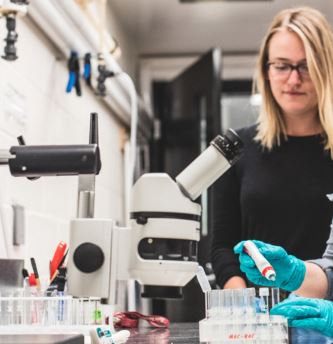What do you love most about your profession? Why did you choose this career?
My job is to create resources for and provide workshops to educators to help bring ocean data and coding skills into classrooms across Canada! Before this job, I worked as a Biologist researching behaviour and evolution in fishes and realized I enjoyed science communication and teaching scientific concepts. The aspect I love most about my profession is getting others curious and excited about science. I chose this career with the goal of helping youth realize that not only can they be successful in a STEM career, but that they are necessary in STEMs success!
When did you realize you wanted to work in STEM or Skilled Trades?
I developed an interest in biology at a young age - I simply enjoyed being outside, interacting with and learning about the natural world. This influenced the classes I took in high school and the post-secondary path I chose. I didn't quite know what career I wanted to pursue when I left high school, but I continued to follow my interest in biology. During my undergraduate degree, I had the opportunity to work as a Research Assistant in a fish laboratory and as a teaching assistant for biology courses. Applying for these opportunities allowed me to gain experience and insight into what careers in research and teaching would be like.
What was the best advice you have been given?
Perhaps the best advice I have been given is that everyone's path is different. There are no deadlines when deciding what career path you'd like to follow, and there are no timelines to get there. I spent 6 years completing my undergraduate degree - this allowed me to work part-time and try different things. Some people know exactly what they want to do and have a detailed plan to get there. Some people change their path partway through. Some people are finding their way as they go. No one path is the same, and no one path is better than the other!
What do you do when you feel stuck?
When I feel stuck, taking a break always helps clear my mind and reset. This might be a mid-day walk, a day off, or switching tasks for a while. If I am still feeling stuck, I find it helpful to talk about it with someone. Oftentimes, talking through things can help you 'unstick'. Or, you might simply be reminded by a great friend or colleague that it is okay to be stuck and to try again tomorrow!
What do you do for fun? What are some of your hobbies/activities?
I love spending time outdoors and exploring new places. This can be a walk through a part of the city that I don't usually visit or a new hiking trail. I enjoy spending time with family, friends, and my cat (Rex) and dog (Peanut). I also love trying out new recipes in the kitchen and watching football on Sundays!
What advice would you give students who might be considering a career like yours? What advice would you have given your younger self?
A piece of advice that I'd give to students who might be considering a career as a biologist and/or educator is to make connections, understand the opportunities available to you and try different things! Get to know your teachers - stop by their office hours, ask for feedback on your work, and/or inquire about any employment opportunities. Oftentimes, post-secondary institutions hire students for paid work in areas like research and teaching, and these opportunities are a great way to try different things to better understand what you like (or don't like, which is equally as important!) and bring in some income. If you're able to offer some of your time without pay, there are most likely volunteer options in your area, both within and outside of your institution, which could be another great way to form connections and gain experience.


